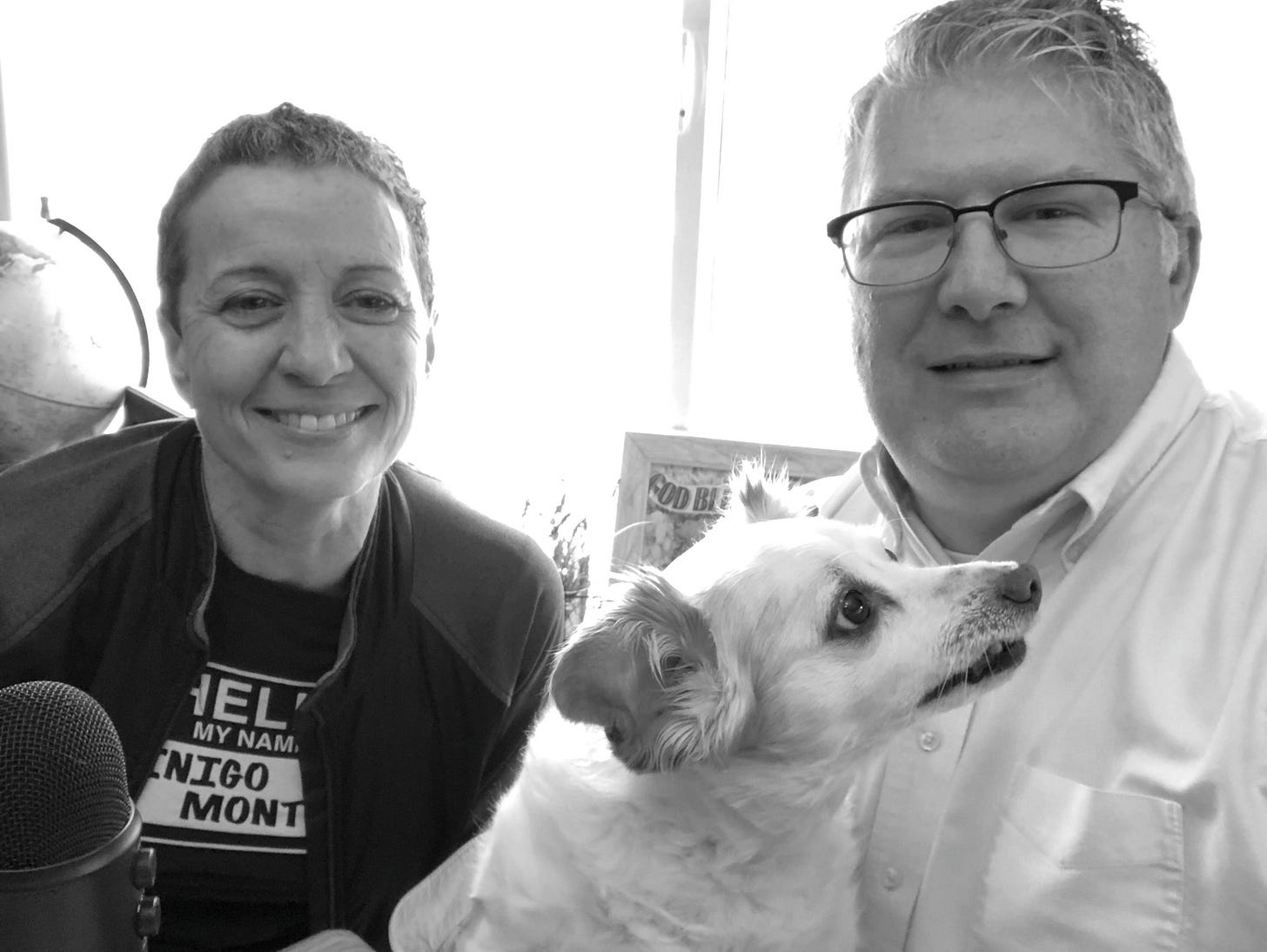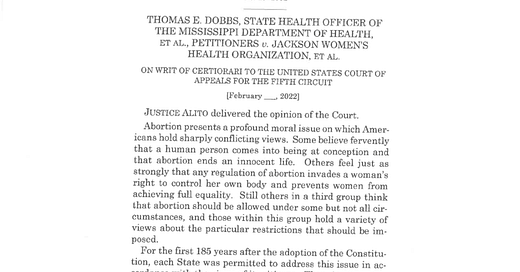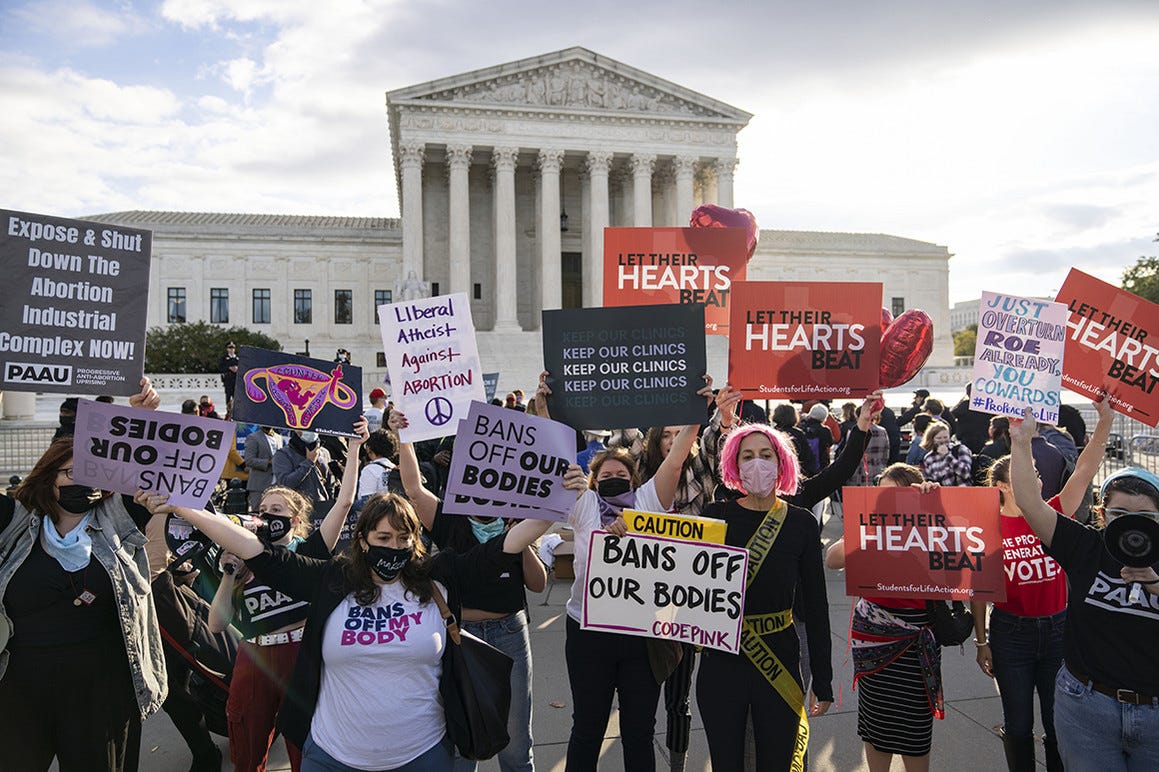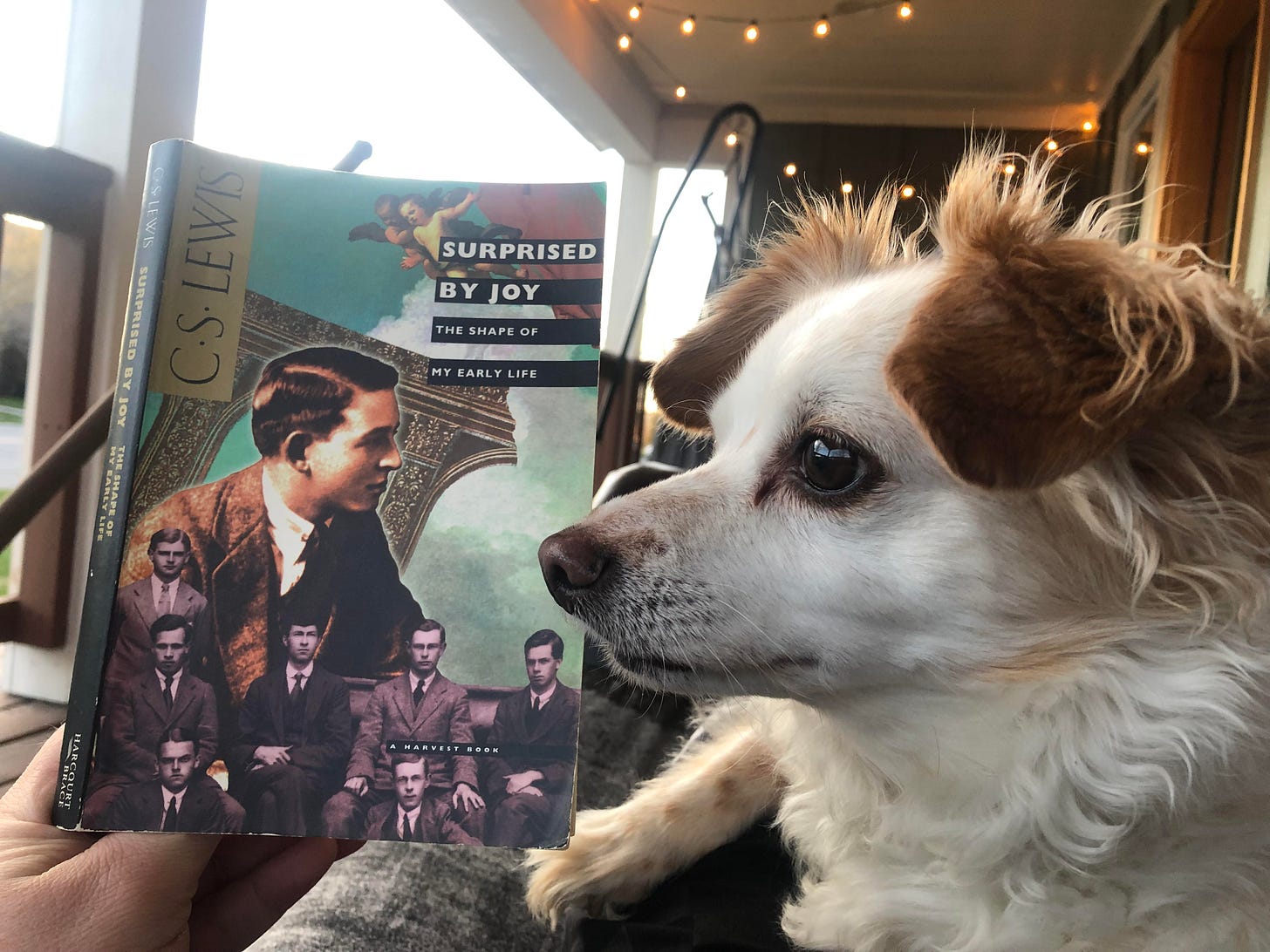Dear Reader,
A few letters from readers:
“On your points about the 2024 presidential election, the biggest issue with ‘Independents’ is that they don’t represent a cohesive political ideology that could concentrate power behind a single candidate. There are left wing independents and right wing independents that are farther apart ideologically than most Republicans and Democrats.
The second big issue is that the structure of our political system is designed (or has evolved) to cement in place the two parties. Any hope for third parties would require a fundamental restructuring of our system into more of a parliamentarian system (my preferred approach). But even this may not stop two parties from dominating the political landscape, see, e.g. Britain. Or maybe we should just have a government of rotating randomly selected citizens.”
I think the reader is probably spot on in terms of how difficult it would be for a third party candidate to be viable for reasons having to do with our political system, but I still want to hold out hope. Concerning the randomly selected Congress, there's definitely something Jeffersonian in the idea (i.e. no career politicians), but part of the problem with our current system are all the bureaucratic staff, aides, advisors, etc. built up in D.C. and outlast plenty a Congressman or Senator. I'm all for continuity...except when it's not working.
“Thanks, Craig, for your book reviews. I was surprised to see a Donald Miller book in there and of your connection to him. I’ve been curious lately why people like Donald Miller, Bob Goff, Rachel Hollis, etc., have found the need to create a ‘new gospel.’ In search for answers, I started listening to [Bruce Shelley’s] Church History in Plain Language. So far (I’ve made it into the 5th century), I’m surprised to hear that none of these new interpretations of the gospel are all that new, as you showed as well by pointing towards 18th century deism.
Anyway, I haven’t figured out yet why human nature is prone to wanting to create a new gospel based often on a “ bloodless stick,” but in the meantime, I’m glad for your reminder I don’t have to be the hero of my own story as I’m pretty miserable at it, and the cross of the gospel is my only hope in this life and in the life to come.”
Like the reader, I struggle to understand the evangelical tendency to create or chase after what’s new. The gospel is the gospel, and for those who are bored with it, it’s more a commentary on them than on it. In Miller's case, it's unfortunate he has walked away from classic orthodoxy (for those on Facebook, he talks about it here). Kudos for picking up Shelley's book on church history. You’re absolutely right in that there is nothing new under the sun when it comes to beliefs. It's all been thought about and tried; we're just getting sequels.
Glad to hear from my readers. As always, thanks for reading Second Drafts.
Craig
Pro-Life, Pro-Woman
“You can observe a lot by just watching.”
Yogi Berra
On Tuesday night, I attended a piano recital in which my youngest daughter, Millie, age 18, participated. Though the oldest recitalist and only high schooler on the roster, she was slated to go first rather than last, setting the bar high with her performances of Chopin and Mozart and getting the recital off to a good start. And she did well.
Two rows ahead of where I was sitting, a young mother sat and held a baby—two weeks old—who spent most of the recital looking back at me (or in my direction; babies’ eyes can’t focus beyond 12 inches at that age) over his mother’s shoulder. He was a good looking young fellow, and I couldn’t ignore his little pink head and dark black eyes as I listened to the music made by those as much as 18 years his senior.
“All it takes is time,” I remember saying to myself. “All it takes is time.”
And then I almost cried.
Do We Have to Talk about Abortion?
I started this week not knowing what I would write about for Second Drafts, but after Monday night’s Politico story on the leak of the Supreme Court’s draft opinion concerning Roe vs. Wade opinion, I figured I’d get here even if I didn’t want to.
And I didn’t want to. I recorded a podcast on abortion back in January, and while my guest, Catherine Aubrecht, was great, abortion is far from my favorite topic. If you’d like to listen to it, I’ve made it available for free, but Catherine’s story—even considering the redemption of it—is not for the faint of heart.

I’ve been living with the abortion debate in the cultural winds since I was two years old. Obviously, I was not a discussion participant in those earliest years, nor even that first decade, but that’s because I was a kid, and believe it or not, there was a time when kids didn’t know much beyond who their favorite baseball player was and what time they were to be home for dinner. It’s a different world now, and I sound as old as I do in saying that because, well, it was a long time ago. And that’s unfortunate.
One of my favorite newly-discovered writers (who also happens to be my same age) is a guy named Matt Labash, who writes a Substack newsletter called, Slack Tide. In this week’s edition, Labash led with the same question I was asking Monday night, namely, “Do We Have to Talk about Abortion?” Maybe great minds think alike (or not), but he came to the same conclusion I did: “Yeah, I guess we do.”
Two Unlikely “Heroes”
You should read Labash’s whole post. I mention him because of a shared experience he and I share: an encounter in life with a guy named Randall Terry. Labash writes:
“Not to be glib about abortion. It’s pretty serious business—literally, life and death. Which is why this new development turned my thoughts to an old profile subject of mine, Randall Terry. Almost exactly a decade ago, when I was still at The Weekly Standard, I did a lengthy profile of Terry, who was then in the middle of an election caper too complicated to recount here, but who was once known as America’s foremost pro-life agitator, having headed Operation Rescue. He’d led a movement that saw 70,000 arrests in abortion protests in what were, up until that time, the largest civil disobedience efforts since the civil rights protests of the sixties.
Terry was always a cross between an angry Old Testament prophet and a rodeo clown/court jester. His enemies—he had them on both sides—accused him of many things, but never of being too subtle. You won’t find Randall referring to abortion services as ‘reproductive health.’ He calls it ‘child killing.’ In protest of what he regards as millions being slaughtered, he might chain himself to an abortion clinic sink, or dump a pile of bloody baby dolls in Nancy Pelosi’s office. As a hobbyist musician, he might perform pro-life songs of his own composition, such as ‘Crying for You Baby,’ sung in the style of his musical hero, Barry Manilow.
Why, just a few weeks ago, after progressive anti-abortion activists (yes, there are some) were indicted for a former protest, shortly after revealing they’d recently recovered 115 aborted fetuses from a medical-waste company driver—with several of the babies appearing to be very late-term and viable—there was Randall shepherding them through the media circus. And just the other night, after the Roe v. Wade news broke, there was Randall in front of the Supreme Court, getting his glasses literally punched off his face by an angry pro-choice activist, while hauling around his ukulele, and singing another of his songs, “We’re Gonna Dance on the Grave of Roe Vs. Wade.” Sample lyric: Baby don’t cry/ You’re not gonna die / Abortion will/ Be a crime. You can watch Randall get punched here. (Scroll to the 1:15 mark.)
Bottom line? Randall’s not everyone’s speed. He’s probably not yours, even if you’re pro-life. But I’ve always had grudging respect for him, and not just because I have a soft spot for eccentric screwballs. (He once filmed a music video featuring a firing squad in Obama masks executing baby dolls with paintball guns to the strains of Alice Cooper’s “Dead Babies.”) But because Randall puts his money where his mouth is: another time, he not only talked a prostitute out of having an abortion in front of an abortion clinic, but he later adopted two of her children. Love him or hate him, but the guy lives his gig.”
Until I’d read Labash’s newsletter this week mentioning Terry (who, indeed, is not my speed, even though I am pro-life), I’d not thought of him for decades. Back in the mid-80s, just after coming to faith at the age of 14, I used to listen to his “Randall Terry Live” show on Christian radio. As I was a new Christian (judge me as you like), Terry was my speed—zealous, bold, passionate—as well as my first real introduction to what abortion—the violent murder of children still in the womb—was.
I was horrified. I was angry. I couldn’t believe this went on in the world, let alone in America. Killing babies made no sense in a country founded on “life, liberty, and the pursuit of happiness.” What had they done to deserve death? They hadn’t even been born yet! I should have stuck with my human instincts and burgeoning understanding of the Bible that this was wrong, but unfortunately, the propaganda did its work: The baby isn’t a baby; it’s a fetus. The baby is unwanted; why let it live? Abortion isn’t the issue, choice is; and who are you to say what a woman does with her body? Even the name “Planned Parenthood” sounded reasonable to my 14-year-old ears.
I hated the idea of taking life by way of the destructive and awful means of abortion, but the pragmatic arguments played with my emotions. I wrestled with what I thought, but I didn’t have enough wisdom or experience to process the issue to a place of resolution. I resonated with much of Terry’s rhetorical railings against abortion, but I struggled to reconcile his harsh tone with what I read of Jesus. On the other hand, I was sympathetic to some of the problems presented in the propaganda, but I couldn’t see how killing the child was a good answer to any of them.
Finally, I asked a man I loved and deeply respected (whom I later discovered was one of the few fiercely pro-life Democrats I’ve ever met) how he thought about abortion.
“‘Well,’ he said, ‘let me get your opinion. A father has syphilis and the mother has tuberculous. Of their four children born, the first was blind, the second died, the third was deaf and dumb, and the fourth was also tuberculous. Would you abort their fifth pregnancy?”
‘I don’t know,’ I said.
‘That’s not an option,’ he said. ‘She’s pregnant. Does she abort or have the baby?’
‘Well,’ I said, trying to sound logical, ‘I, uh, wouldn’t want to, but I, uh, I think I would abort the pregnancy.”
“Then you would have murdered Beethoven.”
To be clear, the proposition is a total fallacy of the correlation/causation kind, suggesting that going forward with the pregnancy would have surely robbed the world of an extraordinary human being and composer. Peter Medawa, who won the Nobel Prize for Physiology and Medicine in 1960, critiqued the argument this way:
“The reasoning behind this odious little argument is breathtakingly fallacious, for unless it is being suggested that there is some causal connection between having a tubercular mother and a syphilitic father and giving birth to a musical genius the world is no more likely to be deprived of a Beethoven by abortion than by chaste abstinence from intercourse.”
Richard Dawkins, author of The God Delusion (you can imagine his take on things by the title), notes that robbing a human embryo of its potential life through abortion is,
“…a rhetorical argument whose extreme stupidity is its only defense against a charge of serious dishonesty…The question, and the legend behind the tale, are entirely false, noting that Beethoven was the oldest surviving child of his parents (being second only to one who died in infancy—which was common at the time), was not disabled as a child (though deaf with old age), and neither parent had syphilis nor tuberculosis at the time of his birth.”
Now, at the age of 51, and having taught the subject of Logic to seventh graders and college freshman alike, I see the argument for what it is; however, I don’t discount my friend’s conviction and good faith attempt in sharing it, going against his otherwise Democrat-informed politics of “choice” in the name of “life.” Life mattered to him; as a result, it came to matter to me. And, while I don’t consider Randall Terry the best voice from my past I would listen to regularly today, as Labash observes in his post,
“…because he (Terry) takes abortion as seriously as the rest of us often only pretend to, he frequently asks hard and uncomfortable questions.”
I agree. Perhaps like Harvey Dent in Christopher Nolan’s The Dark Knight, maybe Terry is a kind of weird hero, “not the hero we deserved, but the hero we needed.”
Maybe.
For better or for worse (I’m sure you have your opinion by now, and that’s fine), in thinking through my convictions on abortion, these two flawed men formed and forged in me a commitment to the value and worth of every life. This foundation of civilization has been upheld across the ages in the Scriptures and the Church (at least the ones committed to orthodoxy), validated by human instinct (what would you do if you saw a baby lying in the middle of a street?), and recognized by those whose consciences have not been so calloused as to believe the lie that choice trumps life.
Life is not the problem; “choice”—the modern feminist version of it—is.
Pro-Life, Pro-Woman

Since we’re talking favorite media (at least we were a while ago), let me introduce you to Evie Magazine, a women’s magazine whose online email and website I read daily. That may sound strange—me reading a women’s publication—but as a “girl dad” of four adult daughters, I have found these women to be a huge asset to my fatherhood.
Published after the Supreme Court leak, Gina Florio’s article, “Abortion Is An Anti-Woman Issue That Has Nothing To Do With Bodily Autonomy Or Reproductive Freedom, Despite What You've Been Told,” pushes back against the familiar feminist “choice” narrative to suggest that abortion is not just bad for babies; it’s bad for women as well. She writes:
“We've been told by history books, the media, the entertainment industry, and many politicians that these [Supreme Court abortion] cases grant women bodily autonomy and allow them to exercise reproductive freedom. Most women have been told time and time again that abortion is a basic human right that we all deserve—‘my body, my choice’—is the popular slogan that women have adopted from marches and rallies, and it implies that allowing abortion is the very thing that gives women full control over their bodies. And we're told that making abortion readily available everywhere is a pro-women issue.
But there's nothing more insulting than telling women that they have to end the life of their own baby in order to be successful or happy in their life. In fact, abortion is the very last thing that women should be offered. Abortion is as anti-woman as it gets.”
She goes on, quoting statistics that are not exactly making the front pages of most newspapers and websites, nor being covered by television stations or NPR:
“Abortion at its core is anti-woman. A Californian study showed that women who had abortions were 160% more likely than delivering women to be hospitalized in the first 90 days following the procedure for psychiatric treatment. 44% of women who had an abortion reported suffering from nervous disorders, 31% regretted their decision, and 11% were given psychotropic medicine by their doctor following the procedure.
Not to mention the physical effects that women experience from having an abortion. A survey of 1,182 abortions showed that 27% of the women had an infection that lasted 3 days or longer. The nine most common major complications post-abortion include infection, excessive bleeding, embolism, ripping or perforation of the uterus, anesthesia complications, convulsions, hemorrhage, cervical injury, and endotoxic shock.”
Florio addresses another lede that tends to get buried in the news coverage, namely the one explaining how the abortion industry not only preys on vulnerable women, but also gets promoted by celebrities and provided for by the federal government.
“We know that abortion clinics like Planned Parenthood target lower income neighborhoods more than any other demographic. Politicians and celebrities try to frame it as if the women in these areas need abortions the most because they are poor or uneducated. There’s another insulting, degrading statement. Just because a woman has a different upbringing than you or lives in a different socioeconomic status doesn't mean that she can’t be a mother.
The predatory abortion industry, which is funded and propped up by the federal government, has been preying on vulnerable women in need for decades. These clinics intentionally often fail to offer an ultrasound, and the providers outright lie about what the abortion actually entails. Women are often coerced into making the choice to end the life of their innocent baby because they’re struggling financially or maybe don't have a huge support system. The people who work for the abortion industry exploit women who are feeling scared and helpless. This is inexcusable and reprehensible.
The worst part is, abortionists use buzzwords to try to flip the script and make it sound like abortion is empowering. They use terms like bodily autonomy, reproductive justice, and healthcare to lie about what their true goal is: killing innocent babies in the womb. Additionally, clinics like Planned Parenthood lie about providing healthcare services for women and, even worse, they sell parts of aborted fetuses for research. This is nothing short of predatory, disturbing behavior that doesn't have women’s best interests in mind.”
Women Supporting Women?
Facts are often pesky and inconvenient things, but that doesn’t mean we get to ignore them. The reality is abortion is big business in America, and even bigger is the lie that there are no options for unwanted pregnancies other than murdering the child.
Depending on your source, there are between 2,500 and 4,000 crisis pregnancy centers throughout the U.S. Planned Parenthood hates them. Also, and for the sake of combatting the rhetoric that the Church does nothing to care for women who find themselves with an unplanned pregnancy, I’d encourage a little Internet searching for help in your area before swallowing that whopper. I am neither aware of, nor ever been part of a church unwilling to come alongside a pregnant woman genuinely seeking help in her situation. I find the claim ridiculous and pure propaganda.
In addition, as a former foster parent to 14 different kids five-and-under, who once brought home a three-day old baby straight out of the hospital, I can tell you firsthand how the government can’t get out of its own way to let churches and potential adoptive parents step in with solutions for so-called “unwanted” children. The resources are there; unfortunately, so is the bureaucracy and politics of “choice.”
Planned Parenthood accuses the pro-life movement of putting pressure on pregnant women to have the babies they’re carrying, but very little attention is paid to pro-choice groups—especially the militant kind—who, by way of their antics and their women’s marches, apply at least comparable duress to pregnant women choosing to give birth. This coercion often manifests itself in the rhetoric of “not giving in to the patriarchy,” which is code for, “if you don’t get an abortion, you’re not one of us because you’re not really a strong woman.” So much for women supporting women.
A Feminine Falling Away
The result (at least as I’ve seen it in my social media feed) has been a flurry of recycled mantras and memes from women who are drinking the pro-choice Kool-Aid. (Note: I realize it takes two to tango, so before anyone writes me an angry email wanting me to lay smack on the male population for our part in the dance, listen to the podcast.)
Girls I taught when they were in high school—who once called themselves Christians —make no such claim anymore; now, in their twenties and early thirties, their passion for their “right to choose” to murder has replaced their “responsibility to choose” abstinence. I see women of my generation—parents of those in their twenties—go along with or, by their silence, endorse an evil re-interpretation of the word, “mother.” I see older women—so-called “heroes” of the feminist movement—lament for the younger generations, making ridiculous claims (and this is an actual tweet I saw), that,
“It’s unbelievable that in 2022, our daughters will have fewer rights than they did 50 years ago.”
Thankfully (and humorously), a female friend and mother of two who is my age replied:
“It’s unbelievable because it’s untrue.”
Indeed. Even if Roe vs. Wade is repealed (which I hope it is), abortion does not go away but to the states to decide. This will only contribute to further dividing the country, as people vote with their feet and move accordingly. I’m praying this division might bring us to our knees in recognition that, when dealing with issues of morality, political and judicial solutions are not really solutions at all. But that would be a “best case” scenario (and we in America aren’t very good at creating those anymore).
Honoring “Mother”
It’s ironic—even painful in a way—that all this took place during the week leading up to Mother’s Day. It’s difficult to think of a more beautiful word—“mother”—having its essence so maligned by the vitriolic defense and unbridled pursuit of advocates for “abortion rights” (two words that have never shared space in our Declaration or Constitution, and why the Roe vs. Wade ruling was problematic from the start).
As Florio writes in her Evie piece,
“There is nothing about abortion that is pro-women. Giving birth to children is the most incredible, empowering thing that women are naturally entrusted with. That doesn't mean that all women have to give birth in order to be a woman, but it does mean that offering to take away this truly awe-inspiring experience has tremendously negative consequences for women.”
This weekend, if you wish a woman a happy Mother’s Day, don’t forget to thank her for choosing to become a mother—especially if she happens to be your own.
Peaches’ Pick: Surprised by Joy by C.S. Lewis
Part memoir, part history, part apologetic, C.S. Lewis’ book, Surprised by Joy, is Peaches’ Pick for May. From the back cover:
“C. S. Lewis—the great British writer, scholar, lay theologian, broadcaster, Christian apologist, and bestselling author of Mere Christianity, The Screwtape Letters, The Great Divorce, The Chronicles of Narnia, and many other beloved classics—takes readers on a spiritual journey through his early life and eventual embrace of the Christian faith. Lewis begins with his childhood in Belfast, surveys his boarding school years and his youthful atheism in England, reflects on his experience in World War I, and ends at Oxford, where he became ‘the most dejected and reluctant convert in all England.’ As he recounts his lifelong search for joy, Lewis demonstrates its role in guiding him to find God.”
Pick up a copy and read along with us! Book review on Saturday, May 28.
Fresh & Random Linkage
“Could Cities Soon Be Made of Mushrooms?” - My wife would be excited, but the jury’s still out for me.
“The Best Margarita in Every State” - Linking here, not because of Cinco de Mayo yesterday, but because after this week, I think we could all use one.
Until next time.
Why Subscribe?
Why not? Second Drafts is a once-a-week newsletter delivered to your inbox and it’s totally free. To receive additional monthly content (podcast, book review), subscribe for $5/month.
Keep Connected
You’re welcome to follow me on Twitter.






